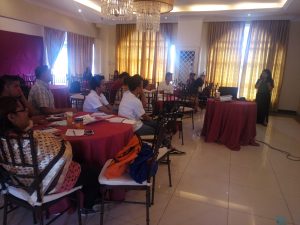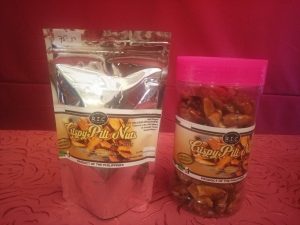LEGAZPI CITY, ALBAY –“It will sell your product without you talking. It creates a first impression and increases trust level. We buy products we trust.” This is the essence of product packaging and labeling according to Creative Design Strategist Melany Reyles of TwinPears Advertising Services.
To equip farmer-entrepreneurs and agricultural technicians with the latest technology and basic know-how in developing and promoting their products, the Department of Agriculture through its Agribusiness and Marketing Assistance Division (AMAD) in Bicol, conducted a Capability Enhancement Seminar on August 29, 2018, this city. A total of 17 individual agripreneurs, ATs, community facilitators, and Rural Improvement Club (RIC) members participated in the said activity.
According to Reyles, most but not all farmer-entrepreneurs put less premium on extra effort, extra investment and extra labor simply because they can sell their raw products as is. The seminar was designed to expose the participants to value-adding and processing as well as instill the value of branding to encourage them to think outside the box and create opportunities to increase their income.
“The ultimate goal is to build a competitive and profitable brand. Sana out of this group, merong ma-push na maging “the one”–the profitable brand (The ultimate goal is to build a competitive and profitable brand. Hopefully, it will motivate somebody from this group to be “the one”–the profitable brand),” she said. She underscored that effective marketing requires products to be integrated into the lifestyle of the buyers.
She also emphasized the value of knowing one’s product–whether it is a need, practical and rational decision purchase or a rewarding product; market profiling—knowing their lifestyle, location, habits and purchasing power; establishing one’s product identity; selecting appropriate and attractive packaging—applying the principle of suggestive use; and integration of costing vis-a-vis perception.
Eleanor Saberola and Susan Lotivo, members of RIC Napo in Polangui, Albay, eagerly listened to Reyles’ discussion. Both were excited to share the fresh ideas and knowledge they gained from the seminar with their co-members to boost their product sales. The RIC engages in several home-based industries like pili nut candies processing; sewing draperies, curtains, seat covers, rag and pot holders; rice puto and turmeric powder production; mushroom and papaya pickles production; herbal oil production; peanut butter, coco jam and native snacks processing and salted egg making.
Likewise, aspiring agripreneur Jaime Brizuela of Brgy, Bombon Tabaco City, was so grateful for the chance to attend the activity.
“Dakulaon an sakuyang pasalamat na naimbitaran kami ngonian dahil sa dakulon an mga ideya na nakua ko. Tanganing sa pagpoon ko kan sakuyang negosyo aram ko kun ano an gigibuhon (I am very thankful that we were invited in today’s activity. I gained a lot of ideas necessary for me when I start my own business),” he said. Brizuela plans to venture in abaca handicraft making, cacao and pili nut candies processing and production.
Reyles and TwinPears Advertising Services who are the brains behind the packaging and promotional materials of Vicky’s Pili and Food Products, J. Emmanuel Pastries, and Costales Nature Farms hope to see the participants actively standing out in trade fairs with their new product brands.
“Have a good brand name, have a good face, have a good identity para distinct, unique, na hindi ordinary para mag-stand out kasi ang dami-daming competing brands. It’s tough really for a start-up to penetrate markets not unless very unique yung product ninyo (Have a good brand name, have a good face, have a good identity to make your product distinct, unique, and extraordinary enough to stand out among competing brands. It’s tough really for a start-up to penetrate markets not unless your product is very unique),” she added.
The Department of Agriculture visualizes a competitive, sustainable and technologically-based agriculture and fishery sector, driven by productive and progressive farmers and fisherfolk, supported by efficient value chains and well integrated in the domestic and international markets, contributing to inclusive growth and poverty reduction. (Annielyn L. Baleza, DA-RAFIS 5)



